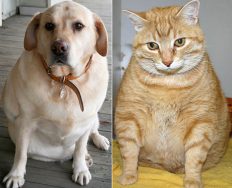 Thanks to remarkable technological advances in veterinary medicine, pets are now living longer than ever before. But, along with the increased lifespan of our pets, comes a long list of conditions that can negatively affect them like: weight and movement issues such as osteoarthritis, kidney, heart, and liver disease; tumors and cancers; hormone disorders such as diabetes and thyroid imbalance; and many others. It’s important for pet owners to work closely with their veterinarian to arrange a health plan that is best for their senior pet.
Thanks to remarkable technological advances in veterinary medicine, pets are now living longer than ever before. But, along with the increased lifespan of our pets, comes a long list of conditions that can negatively affect them like: weight and movement issues such as osteoarthritis, kidney, heart, and liver disease; tumors and cancers; hormone disorders such as diabetes and thyroid imbalance; and many others. It’s important for pet owners to work closely with their veterinarian to arrange a health plan that is best for their senior pet.
Keep in mind that we as pet owners can also slow down and or ease the aging process of our furry family members. By providing your pet with routine mental and physical stimulation, this can help slow down the aging process drastically. Regular massaging isn’t only good for elderly pets with stiff joints but also helps improve circulation throughout the body. Countless research studies have also shown that continual mental stimulation helps the brain grow and allow more connections to be made throughout the process. You can slow the natural decay of the brain by routinely providing your dog with mental stimulation.
 A healthy diet is also key when it comes to elderly pets. Feed your pets regular well balanced meals with high levels of antioxidants and minerals needed to sustain high performance; keeping in accordance to veterinary recommendations. Feeding your elderly pets balanced portions of grains, minerals and healthy fats will surely help increase life expectancy.
A healthy diet is also key when it comes to elderly pets. Feed your pets regular well balanced meals with high levels of antioxidants and minerals needed to sustain high performance; keeping in accordance to veterinary recommendations. Feeding your elderly pets balanced portions of grains, minerals and healthy fats will surely help increase life expectancy.
Just as the health care needs of humans change as we age, the same applies to pets. Over time, as your pet’s body ages, their heart muscles become less efficient—essentially working harder to pump the same amount of blood through their body. In addition, the blood vessels lose some of their elasticity and hardened fatty deposits may form on the inner walls of your pet’s arteries, called atherosclerosis. These changes make the arteries stiffer, causing your pet’s heart to work even harder to pump blood through them. This can lead to hypertension and other cardiovascular problems as well as extensive weight gain and the inability to shed those extra pounds. Although fast paced cardiovascular activity for your elderly pet is frowned upon, several short slow-paced walks or playtime can be just as beneficial.
In order to help your elderly pets live comfortably during their senior years, it is critical to work closely with your veterinarian to tailor a wellness plan for your pet. Remember to keep a close eye on behavioral and physical conditions and report anything unusual to your veterinarian who can help your pet reach its golden years with ease!


